I departed San Diego bright and early Wednesday morning and thanks to Wi-Fi on the plane I only have about 400 emails left to read (if I owe you a reply, please give me a day or two.)
I covered a fair amount of ground in my previous posts but here are a few random, if rambling musings. Hold on for the ride.

I had noticed a particular vendor posted several Tweets encouraging attendees to stop by their booth at specific times for a demo of their latest software. I headed to their booth at the specified time and had a conversation with an employee that went something like this:
Me: Is the demo of the new EMR version just for existing customers or would it be helpful for someone who just wants to see your EMR?
Vendor: It’s really for existing customers. Are you looking to buy a new EMR?
Me: Actually I am not with a practice.
Vendor: Oh, well you might just want to come back in a couple of hours and see our presentation on ICD-10 because that will include information applicable to anyone.
Me: Hmm. Okay.
So, I went away in frustration, wondering why I was not offered some sort of EMR demo, not to mention why Vendor would think a presentation on ICD-10 would be a good substitute for a look at their latest EMR software. Could it be because my badge did not say “practice administrator?” Maybe they were thinking I only wanted a demo to get in the drawing for their tablet giveaway. Maybe next year.
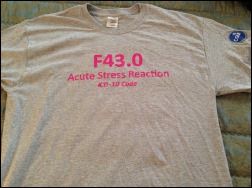
On the other hand, I had an amazing experience with the folks at CompuGroup Medical. The staff was wearing the t-shirts above, which I thought were quite clever. I told a couple of the ladies I really loved the shirts, and they mentioned they had been giving them away but had just run out. I expressed my disappointment, continued chatting a bit, and then the CEO Norbert Fischl walked over and told me he’d give me his t-shirt if I I took a few minutes to hear about their disease management platform. To clarify he did not give me the shirt off his back – just an extra one he was taking home. It was more than a fair trade and I learned about their offering that integrates patient data from EMRs, claims, labs, pharmacies and other sources to identify at-risk patients based on evidence-based clinical standards. Providers can then create personalized health goals for individual patients and track their progress. Their target market includes ACOs and payers that need tools for automating the chronic disease management process and for proactively identifying at-risk patients. CompuGroup also offers several EHR, PM, RCM, and portal solutions and internationally sells products for clinicians, hospitals, pharmacies, insurers, and the government. If there were an award for Best Effort to Draw Someone Into Your Booth and Look at Your Product, CompuGroup and Norbert would win hands down.

I chatted with one of the Practice Fusion reps for a while. They seem like a young and enthusiastic bunch, which gives me some insight into the company’s culture. I asked him how the company made money if the EMR was free, and he told me about the ads that display in the software. I tried to get him to tell me what the company was doing in terms of selling de-identified PHI but he claimed he didn’t know much about that. I’m pretty sure he was telling me the truth since he was primarily involved with getting providers signed up on the EMR. I believe he said that the company currently has 30,000 active physician users.
Speaking of Practice Fusion, I had a few conversations with folks about their recent $70 million round of funding. It seems to have a number of smart people scratching their heads, though one person did tell me he believes the company is well-run and does good job continually enhancing the product.

Julie at Clinicspectrum stopped me and told me a little bit about her company, which provides back office services for practices, hospitals, and billing services at a set rate of $6.50 per hour. They off-shore their services but you have to love the simplicity of the model.
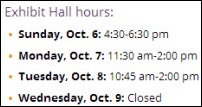
I asked several vendors how the show was and the general consensus was very positive. Several expressed disappointment, however, with the limited amount of time the exhibit hall was open. One person shared MGMA’s explanation that they had studied trends from previous years and determined that most leads came in during the particular hours the hall was open this year. Perhaps, but if a vendor is investing thousands of dollars at a trade show and has flown in staff from across the country, I would think most rather have the exhibits open more than three hours a day. Not to mention that lunchtime overlapped the exhibit hall hours, meaning that attendees who wanted to eat had that much less time to check out the exhibits. It will be interesting to see if MGMA decides to keep the same schedule next year.

A friend told me I should check out PatientPoint and it was a good recommendation. Their platform includes a patient check-in/care coordination component that integrates with a practice’s EHR and scheduling system; an exam room piece that takes the place of traditional paper brochures so patients can read up on different conditions while waiting for the physician; an internal communication system for the practice; and, a waiting room monitor to display educational content. They also offer a platform for hospitals and for consumers. It’s all about coordinated care and patient engagement.
Speaking of engagement, it’s amusing to hear the different ways vendors attempt to engage people. As I strolled the aisles, I had eager sales reps ask if I wanted to save money on billing; if I was looking for new options to handle after-hours phone calls; if I had considered using automated patient reminders, etc. Amy at Patient Prompt even offered me a 20 discount on her company’s appointment reminder services if I signed up at the show (I declined.)
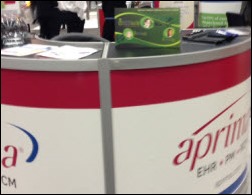
I wanted to chat with the Aprima folks but I never could get anyone’s attention. I was happy to see they had their HIStalk Sponsor sign displayed, as did Wolters Kluwer, IMO, Allscripts, PatientKeper, Vitera, and about 20 others.
I bet we’ll see more and more companies like Ellkay, which offers data migration and conversion services for EHRs. They told me business is booming.
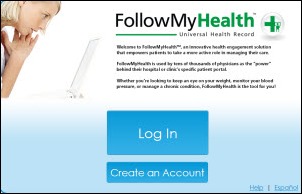
I noticed Allscripts was showing the FollowMyHealth portal, which they purchased from JarDogs earlier this year. The rep told me they have been selling more of the FollowMyHealth product than the Intuit/Medfusion platform because customers say it offers more functionality. Allscripts is selling FollowMyHealth to their own customers, as well as non-Allscripts practices.
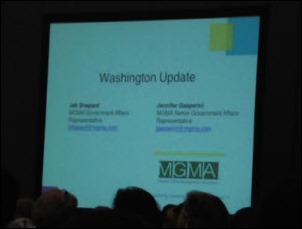
MGMA’s Jeb Shepard and Jennifer Gasperini led a session offering updates on healthcare-related happenings in Washington. It covered a lot of ground and was informative but also pretty depressing. Jeb also gave an excellent and non-political explanation of the ACA and the insurance marketplace. The speakers offered their email addresses in case attendees have questions in the future. Duly noted.
In terms of booth traffic, athenahealth seemed to be buzzing every time I walked by. I also listened in on a demo and overheard one of the execs being drilled by a CIO-type on data security, connectivity guarantees, redundancy and similar topics. The answers were solid, giving me insight into some of athena’s success.
Sunday afternoon, while waiting for the exhibits to open, I chatted with an administrator from a large practice that uses Vitera. He had experience with a number of other products, including Greenway. He felt strongly that once the Vitera/Greenway merger was complete, the Greenway management team would be taking over because their product, reputation, and company culture was superior. I disagreed but shared this conversation with a few other folks over the next couple of days. The general consensus: Vista and the Vitera team will end up calling the shots, though the Greenway leaders may stay on for a while.
I may need to reflect on this a couple more days, but if I could pick a single word to summarize attendees’ general state of mind it would be “anxious.” Anxious, as in they see many changes looming in terms of payment models, practice ownership, and government regulations. Maximizing revenues and cutting costs remain the top priorities, meaning practices must figure out the most painless path to ICD-10, evaluate whether the benefits of later MU stages are worth the effort, and whether their physicians (and patients) would be better served if they consolidated with a health system or another group, or participated in an ACO, or converted to a PCMH model. HIT tools are available to ease some of the pains, but it’s no doubt overwhelming to find, implement, and pay for new products, especially as more vendors consolidate and products are sunset. Gosh, do I sound like the oft-pessimistic Mr. H with all this doom and gloom?
Thanks MGMA for a well-run, informative, and fun conference. See you next year in Vegas!

Email Inga.




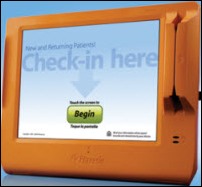

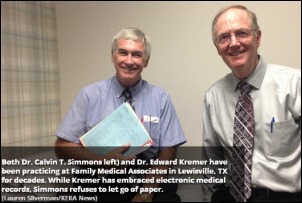



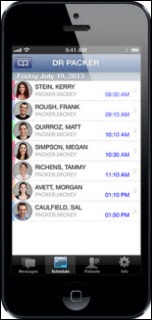

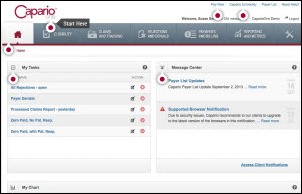
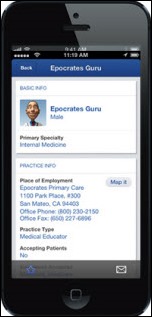
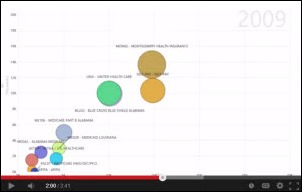


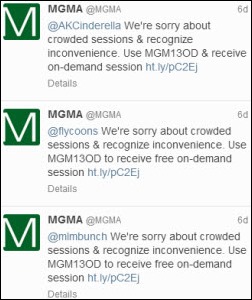









The article about Pediatric Associates in CA has a nugget with a potentially outsized impact: the implication that VFC vaccines…